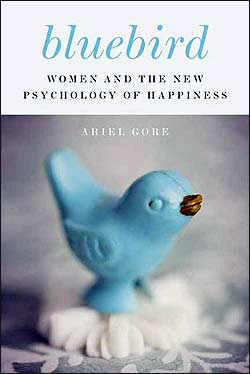Loving Your Body 2010
Not Your Average Yogi Gentle on the joints, good for the soul
Empowering Girls and Women, Artfully Friends With Heart benefits artists, Ophelia’s Place
Different Paths to Mental Health Alternatives to medication for mentally ill patients
Love Inspired Body Care Recipes Celebrate Valentine’s Day with handmade body care products!
Smile! A review of Bluebird: Women and the New Psychology of Happiness
Smile!
The majority of the books about happiness that have crossed my desk in the last few years were written by men. Stumbling On Happiness, The Geography of Bliss, The Architecture of Happiness — dudetastic. When Portland writer Ariel Gore started her look into the psychology of happiness, she noticed something similar: “Most psychologists note that the emotional lives of men and women are different,” she writes, “but a majority of the commonly cited studies rely on male subjects.”
 |
What of women’s happiness? In the compact and engaging Bluebird: Women and the New Psychology of Happiness (Farrar, Straus & Giroux, $24), Gore writes, “Women’s notions about personal happiness are all tangled up with our ideas about privilege, selfishness, and social responsibility.” The chapters that follow consider the importance of “good cheer” in the American psyche (particularly for the middle class) and the ways work, relationships and class affect women’s happiness, from the image of women as selfless caretakers to the relationship women have with money. Some of Gore’s observations are too familiar to feel fresh, and her first chapters tread familiar ground for anyone with a basic grasp on feminism. But Gore has a disarming way of slipping history and research into the most personal parts of her narrative. She doesn’t draw a line between what she’s learned and what she’s lived; she connects the two, effectively using history to illuminate anecdote and vice versa.
There is a self-help aspect to Bluebird, but it’s pensive rather than instructive. Reading Gore’s contemplation of what she’s studied and experienced, I found myself following her lead — asking myself the questions she asked her intervewees, considering when I’ve lost myself in a task or experience and thinking about what it actually means to be happy. Gore’s suggestion that, “The happiness we are trying to grasp is the experience of trying to grasp it” echoes advice we’ve heard for years: be engaged, be aware, be mindful of what you want from the universe. But her honest, personal and thoughtful take on the happiness question might be just the thing to nudge an already self-aware cumudgeon into a happier place. — Molly Templeton